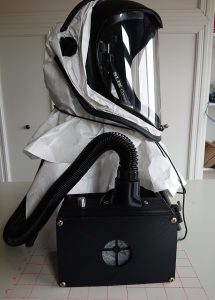BRANDON – Ongoing shortages in N95 masks have motivated a Brandon University (BU) laboratory to partner with Brandon Clinic to develop a respirator that could be used to limit the spread of COVID-19.
Although cloth masks are recommended to control the spread of amongst the general population, these masks do not provide sufficient protection for medical staff where the risks of transmission of COVID-19 are the highest. These workers need to be shielded from the virus and require Personal Protective Equipment (PPE) of a much higher standard. The best-known examples are N95 masks that are rated to filter out 95 per cent of particles. However, disruption to global supplies of respirators has prompted medical service providers to seek alternatives to protect against COVID-19.

“In general, we are seeing unprecedented shortages in respiratory protection due to disruption in global supply lines,” says Darcy Bell, CEO of Brandon Clinic. “Locally sourced Personal Protective Equipment will play a major role to ensure medical personnel are safe and reduce disruptions in essential services, which will in turn keep our communities safe.”
To address these needs, BU researchers, Brandon Clinic, and BU Bachelor of Science students Jessica Li and Jeffery Li have partnered to develop a helmet-style powered air purifying respirator (PAPR). Termed the Canadian PAPR (CAN-PAPR) project, the system they designed utilizes a certified N100 filter which will eliminate 99.97 per cent of aerosolized particles and will operate for 10 hours on a single charge.
“PAPRs represent a more integrated protection system. There is a full-face shield, head and shoulder coverage and a tube that delivers filtered, lightly pressurized air from a waist-mounted unit,” says project lead Dr. Vincent Chen, Associate Professor in the BU Department of Chemistry. “In general, PAPRs are more comfortable to use than tightly fitted face masks. Depending on design and fit, PAPRs will be 10 to 1,000 times more protective than N95 masks.”
Chen says CAN-PAPR will remain open source, meaning their designs will be freely available to others to customize and use their plans. Utilizing 3D-printed parts, Chen and Bell have entered in a dialog with Innovation, Science and Economic Development Canada and the Natural Sciences and Engineering Research Council of Canada (NSERC) for development, and to distribute and test their prototypes. To ensure COVID-19 counter measures are in place, the BU lead team is working to scale production and continue tests in preparation for regulatory certification and official approval.
“As a nation, we have done a pretty darn good job of ‘flattening’ the curve. As we prepare to reopen the economy, our gaze has now turned towards controlling secondary waves of infection – or any future pandemic for that matter. We are hoping for the best, but planning for the worst,” Chen says of the continuing efforts.
“In developing nations, with little to no resources or insufficient supplies of protective equipment, the impact of this project would very likely be immediate. This is why we are trying to get the word out.”
“This is a real grassroots effort to fill a major need in Canada. I’m excited that our students are able to be engaged in project that is so meaningful to our community,” Chen continues. “It’s rewarding that we could come together, collaborate and to do our part to fight COVID-19.”
Contact
- Brandon University
- communications@brandonu.ca
To receive any BU publication in an alternate format please contact Communications@BrandonU.ca
About BU
Success is built at Brandon University. Our growing, progressive campus welcomes a diverse and inclusive community that combines proud tradition with shared ambition. Through our excellence in teaching, research, and scholarship, we educate students to make a meaningful difference as engaged citizens and leaders. Join us at BrandonU.ca.